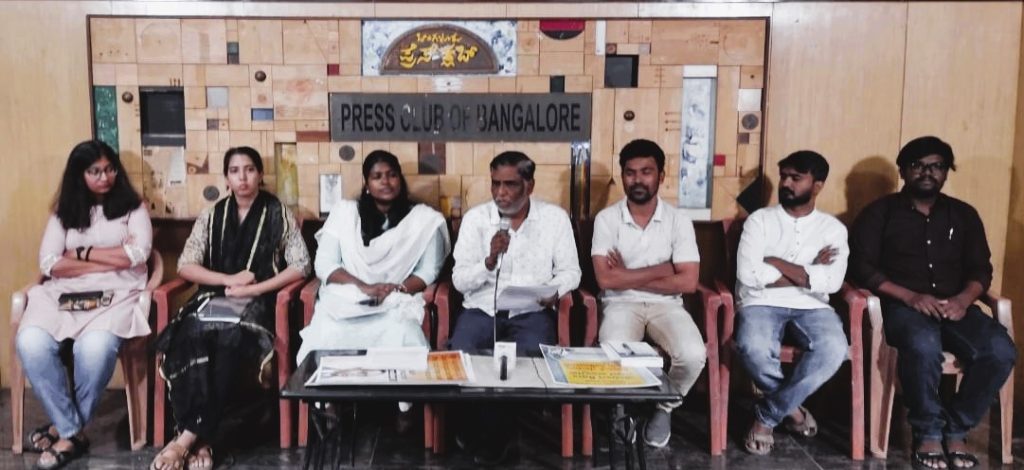Call for Rohith Act Gains Momentum as Activists Demand Justice for Dalit-Bahujan Students
📰 Dalit-Bahujan Students Call for Justice: The Rohith Act Movement Intensifies
Bengaluru, April 1, 2025 — A major people’s movement advocating for the implementation of the Rohith Act has been launched across Karnataka, demanding immediate action against caste discrimination in higher educational institutions. Activists, student organizations, and civil society groups are calling on the state government to announce the enactment of the law by April 14, coinciding with Ambedkar Jayanti.
The Urgent Need for the Rohith Act
The Indian Constitution, drafted by Dr. B.R. Ambedkar, guarantees equality and dignity to all citizens. However, even after 75 years of independence, Dalit-Bahujan students continue to face systemic oppression in higher education. The tragic institutional deaths of Rohith Vemula and Payal Tadvi exposed the deep-rooted caste discrimination plaguing universities.
Disturbing statistics highlight the gravity of the issue. Between 2014 and 2021, 122 students in IITs, IIMs, NITs, and central universities died by suicide—68 of them belonged to SC/ST/OBC communities. Additionally, from 2018 to 2023, over 13,000 Dalit-Bahujan students dropped out of central universities due to institutional barriers. The Thorat Committee report has further documented how caste discrimination permeates hostels, messes, playgrounds, and even academic spaces.
“These figures are not just numbers; they are stories of dreams crushed by an oppressive system. We cannot remain silent,” said Mavalli Shankar, State Coordinator, DSS Okkuta.
Government Apathy and Privatization Worsen the Crisis
Despite alarming reports, the Karnataka government has failed to act decisively. Public education remains underfunded, while privatization and centralization—through policies like NEP, CUET, and NEET—further alienate marginalized students. Recent reports revealed the appalling state of SC/ST/OBC hostels, where students lack even basic amenities like clean water and nutritious food.
“Education is a fundamental right, but for Dalit-Bahujan students, it remains a privilege denied,” remarked Basavaraj Kouthal, a senior Dalit activist.
A Law for Dignity and Equal Opportunity
Existing laws, such as the SC/ST (Prevention of Atrocities) Act, address overt crimes but fail to tackle the everyday discrimination within educational institutions. The Rohith Act seeks to fill this gap by mandating caste-sensitization workshops, ensuring strict anti-discrimination policies, and promoting support systems such as English language training for marginalized students.
“Despite UGC regulations, discrimination persists because of weak implementation. The Rohith Act will ensure accountability,” asserted Dr. Ashna Singh, Assistant Professor, National Law School of India University.
A People’s Movement for Change
The Campaign for Rohith Act is mobilizing students, intellectuals, and activists to press for immediate legislative action. Key demands include:
- The Karnataka government must announce the implementation of the Rohith Act by April 14.
- A committee with Dalit student representatives must be formed to oversee its implementation.
- Immediate steps must be taken to eliminate caste-based discrimination in higher education.
- The ultimate goal is the annihilation of caste and the establishment of an equal and just Karnataka.
“The government’s silence is unacceptable. We urge students and the youth to rise against this injustice,” emphasized Ms. Mrudula V, advocate for the Campaign for Rohith Act.
The movement has gained significant traction, with rallies and discussions planned across Karnataka. As the fight for justice continues, activists vow to persist until the government delivers on its promise of equality and dignity for all students.

Summary:
The Campaign for Rohith Act is a growing movement in Karnataka demanding a strong legal framework to end caste discrimination in higher education. With rising dropout rates and institutional oppression of Dalit-Bahujan students, activists and student leaders are urging the government to announce the implementation of the Rohith Act by April 14, 2025. The law aims to ensure dignity, equality, and a safe academic environment for marginalized students, addressing gaps in existing legislation.
Context & Background:
-
Rohith Vemula, a Dalit PhD scholar, died by institutional oppression in 2016, exposing the caste bias in India’s education system.
-
Payal Tadvi, a tribal medical student, died in 2019 due to caste-based harassment.
-
From 2014-2021, 122 students in IITs, IIMs, NITs, and central universities died by suicide—over half from SC/ST/OBC backgrounds.
-
Over 13,000 Dalit-Bahujan students dropped out from central universities between 2018-2023 due to systemic discrimination.
-
Karnataka’s public education is underfunded, while privatization and centralization (NEP, CUET, NEET) worsen inequalities.
-
Existing laws (SC/ST Act, UGC regulations) do not address institutional discrimination in universities effectively.
Key Quotes:
📢 “Dalit-Bahujan students deserve education without discrimination. The Rohith Act is not just necessary; it is urgent.” — Basavaraj Kouthal, Senior Dalit Activist
📢 “Higher education must be inclusive, but caste remains a barrier at every step. The Rohith Act will change that.” — Dr. Ashna Singh, Assistant Professor, NLSIU
📢 “The government has failed to protect our students. We demand the Rohith Act now!” — Mavalli Shankar, State Coordinator, DSS Okkuta
📢 “Education is a right, not a privilege. The Rohith Act will ensure dignity for every student.” — Ms. Mrudula V, Advocate, Campaign for Rohith Act
Q&A:
Q: Why is the Rohith Act necessary when we already have the SC/ST (Prevention of Atrocities) Act?
A: The SC/ST Act addresses criminal offenses, but institutional casteism in universities is systemic. The Rohith Act will mandate anti-discrimination policies, accountability measures, and student support systems in higher education.
Q: What does the Rohith Act propose?
A: The Act seeks to end caste discrimination in universities through:
✔️ Stronger anti-discrimination policies
✔️ Caste-sensitization workshops for faculty and students
✔️ English training & academic support for Dalit-Bahujan students
✔️ Independent grievance redressal committees
Q: What actions are activists demanding?
A: Activists want the Karnataka government to:
🔹 Announce the Rohith Act by April 14 (Ambedkar Jayanti)
🔹 Form a Dalit student-led implementation committee
🔹 Ensure higher education is free from caste-based bias
Public & Political Reactions
👥 Student Movements & Activists:
-
Protests and rallies have erupted across Karnataka, with student organizations and Dalit-Bahujan groups calling for urgent action on the Rohith Act.
-
“Enough is enough. We won’t let another Rohith or Payal suffer,” declares student leader Dr. Nandakumar P from Central University Kalburgi.
🏛️ Government Response:
-
Karnataka’s ruling party has remained largely silent, despite growing pressure from students and activists.
-
Opposition parties have criticized the government’s inaction, with some leaders pledging support for the Rohith Act.
📢 Academic & Legal Experts:
-
Academics argue that privatization and centralization (NEP, CUET, NEET) have worsened inequalities for marginalized students.
-
Legal experts point out that existing laws are inadequate to address institutional casteism in universities.
Legal & Administrative Aspects
🔹 Existing Legal Framework:
-
The SC/ST (Prevention of Atrocities) Act, 1989 only applies to criminal offenses like physical assault, but fails to address systemic discrimination in education.
-
UGC (Promotion of Equity in Higher Educational Institutions) Regulations, 2012 are poorly enforced, leading to continued discrimination.
🔹 Why the Rohith Act is Needed:
-
The Rohith Act would create dedicated anti-discrimination cells, caste-sensitization workshops, and stronger legal mechanisms within universities.
-
It would mandate English-language training, academic support, and mental health services for Dalit-Bahujan students.
-
Unlike current laws, it would ensure proactive protection rather than post-discrimination redressal.
Opinion Pieces: Voices from the Movement
✍️ “Why We Need the Rohith Act Today” – by Dr. Ashna Singh, Assistant Professor, NLSIU
“Dalit-Bahujan students face discrimination at every step – in classrooms, hostels, and job placements. The Rohith Act is not just about justice for past victims; it’s about creating an education system where no student is humiliated because of their caste.”
✍️ “A Death Sentence by Discrimination” – by Ms. Mrudula V, Advocate, Campaign for Rohith Act
“The state’s negligence has already cost too many young lives. If the Karnataka government fails to act, they will be complicit in the continued oppression of Dalit-Bahujan students.”
✍️ “Will Karnataka Lead the Fight for Educational Justice?” – by Basavaraj Kouthal, Senior Dalit Activist
“The implementation of the Rohith Act in Karnataka could set an example for the entire country. We must keep the pressure on until the government delivers on its promise of equal education.”
![]()












Every one have rights to get equal education
yhr7en